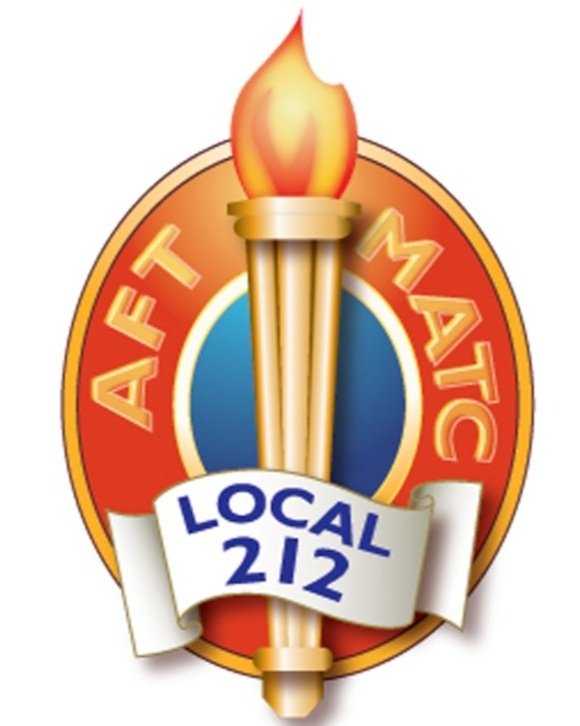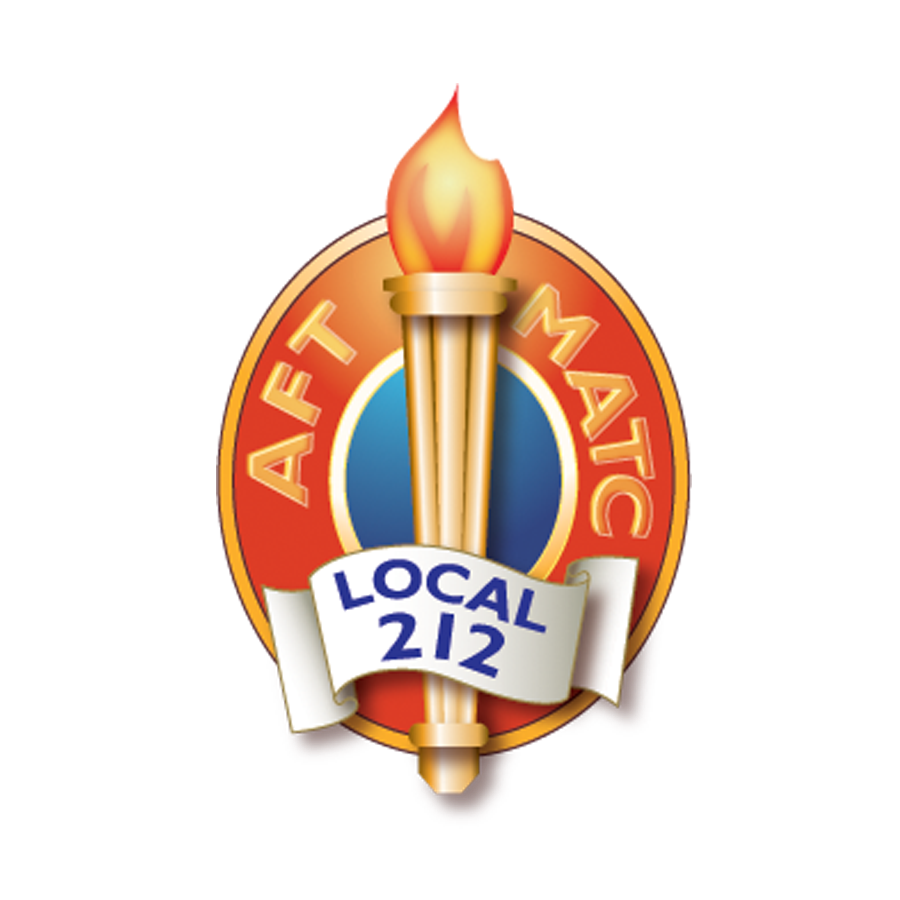President’s Message
Welcome back.
And welcome to the new faculty. We look forward to your contributions and to your participation in Local 212, the union that has been the voice of MATC’s faculty, counselors and professional staff since 1930!
Frank Shansky, Local 212’s director of labor relations recently retired. Frank has worked tirelessly, not only on behalf of Local 212’s members, but to make MATC a better, more effective, more accountable and fair institution. He is not here this morning. But all of us owe him a debt of gratitude.
Would Richard Cohn please stand. I am happy to announce that local 212 has hired Richard, a part time ESL instructor and retired MPS principal, as Frank’s replacement. Please welcome Richard with a round of applause.
Our enrollment is down. Those of us who have been around awhile, and that includes me, know that our enrollment closely tracks the economy. When unemployment is up, our enrollment soars. That’s what happened during the Great Recession. When unemployment drops, so does our enrollment.
This decline in enrollment is a national phenomenon affecting two-year colleges. The bulk of the decline is taking place among older and female students which helps explain our steep decline since our students are older than traditional college students and predominantly female.
Our students enroll because MATC is their ticket to skills and higher paying employment. When the economy is growing and jobs or more hours or pay are available, who can blame them from jumping at the chance to make more money?
I recently ran into a former student who dropped out of school in the early spring years ago to take a job at Harley Davidson. I tried to convince him to stay in school. But he had to work all the overtime he could to catch up. When we bumped into each other he had just retired from Harley. Statistics label him a failure for not completing his education. But he was a success, a homeowner, who had sent his kids to college and retired with a pension. He thanked me and MATC for helping him and his family Milwaukee is among the nation’s poorest cities. Many of our students are the first in their families to attend college. More than we realize experience hunger and even homeless.
It’s hard to make your education your priority when you are homeless, or when you are the person your family relies on to get grandma to the Dr. or you are the only one working to pay the family’s bills because your mother lost her job or just got deported. These are not exaggerations. I had at least one student in each of these circumstances last semester alone!
Economic insecurity and poverty are huge obstacles to our students’ success. February 18th is MATC Day and we will have the chance to learn more about our students struggles while engaging in community service – I look forward to seeing ALL of you there.
Rather than help our students, the Governor and state legislature have imposed unprecedented cuts to higher ed funding, shifting the burden of paying for college to those who can least afford it. While most states are now reinvesting in higher education, Wisconsin is not. As a result, Wisconsin students now have the third highest student debt loads in the nation. Many of our students simply cannot afford to stay enrolled.
This is one reason the MATC Promise is so important to this community. Unlike the politicians in Madison who refuse to support the Higher Ed, Lower Debt Act, a law that would allow students to refinance their loans at lower interest rates like they are doing in Minnesota; unlike the politicians who are more interested in shaming people for being poor by forcing them to take drug tests or as our students say pee in a cup to qualify for food stamps or unemployment compensation, we at MATC recognize the severe economic challenges facing our students and have launched the MATC Promise. I want to thank Dr. Martin for launching this initiative.
Unlike the federal government which forces students to borrow money at much higher interest rates than it charges the banks; that makes students ineligible for financial aid if they have a drug conviction (how dumb is that?); that has imposed Pell Grant rules that contribute to the decline in enrollment in 2 year schools across the country, MATC is promising qualified new high school grads free tuition.
Almost 3,000 students have applied to the Promise program. Not all will enroll. But many will and it is up to us to help them succeed.
Please volunteer to be a mentor to a Promise student or two or three. The relationships you build will be transformative for your students, but also for you.
We are devoted to our students and their success. That is why Local 212 organized ER and D and Peer Support as professional development initiatives. We will be celebrating their 25 year anniversary this semester with some events.
Despite our commitment to our students, we are often called into hastily called meetings to determine what WE will do to improve retention and student persistence. We are warned that our programs are in danger and we better recruit new students; that we need to work harder to retain those we have. In short, faculty are often left with the impression that the administration thinks declining enrollment is our fault.
I want my faculty colleagues to know nothing could be further from the truth. Every survey conducted by the college concludes that our students love their instructors, value you above all else, that they are extremely satisfied with the instruction they receive; and that you – MATC’s faculty are the college’s greatest strategic asset.
In the eyes of those who matter most – our students – you are doing an outstanding job And while you are often made to feel alone in being responsible for student success – we know it isn’t your fault. We know that potential students are frustrated and give up when they have to wait for up to an hour on the phone trying to enroll; that they are confused and frustrated by our web site, our enrollment process, an online orientation process when many potential students don’t have computer access, our petitioning process, inflexibilities in financial aid – all of which befuddle and frustrate them. They are angry when their emails and phone calls go unanswered, or they receive conflicting information from different sources.
They are frustrated when sections are eliminated making it impossible for them to complete their programs in a timely manner – I could go on and on – many in this audience know this because their kids, neighbors or spouses have experienced these frustrations.
Student success is all of our responsibility. It depends on faculty turning in their grades on time. In the Local 212 handout you received today there is easy reminder about when grades are due.
But it also depends on an administration whose most important job is to support faculty, to listen to them, to help them succeed rather than finding new ways to evaluate and monitor them or imposing new rules on programs without faculty input.
If you can’t tell, I am frustrated. I am frustrated because a lot of the college’s faculty are frustrated. We hear a lot more talk about collaboration – something I and my executive board remain wholeheartedly committed to- than we see practiced.
Knowledge doesn’t only flow from the top down. Those who work directly with students must have an equal voice in college decision-making if we are to become a high performance institution. That means CDM must be used at the front end of decision-making, not only when faculty object to a unilateral change.
Last fall I alerted you to the fact that some of the brainiacs in Madison wanted to merge the UW and tech colleges, a terrible idea since merging two systems with different missions, students populations and cultures was doomed to fail. Fortunately, that misguided initiative died of its own weight, at least for now.
Now another threat has emerged. UWM’s leadership is threatening to cannibalize MATC pre-college division. In response to a draconian $30 million cut in funding, UWM’s chancellor is proposing that UWM open a “college within a college”, to educate underprepared students, our pre-college and adult high school students.
Milwaukee’s underprepared students are not cash cows. And UWM’s faculty, unlike our faculty, are not experts in educating underprepared, adults learners. Even UWM recognizes this. So it is proposing to contract that work to two-year UW colleges fromWaukesha and Washington Counties.
Do I really need to say anymore about why this is a recipe for disaster? Those counties are among the whitest and economically prosperous in the state. Their faculty have virtually no experience with urban students. We are working closely with UWM’s faculty to defeat this foolish proposal.
Finally, I want to urge you all to read the book Just Mercy. Integrate into your curriculum and encourage your students to read it and attend speech by Bryan Stevenson, the author, on March 9th .
The book spoke to me and made me reflect on my students, our work and their lives. Stevenson asks:
Why do we want to kill all the broken people? What is wrong with us that we think a thing like that can be right?
We’ve become so fearful and vengeful that we’ve thrown away our children, discarded the disabled, and sanctioned the imprisonment of the sick and weak- not because they are a threat to public safety or because they are beyond rehabilitation but because we think it makes us seem less broken. We’ve allowed our victimization to justify the victimization of others. We’ve submitted to the harsh instinct to crush those among us whose brokenness is most visible.
The power of Just Mercy is that I belongs to the undeserving. It’s when mercy is least suspected that it is most potent-strong enough to break the cycle of victimization and victimhood, retribution and suffering. It has the power to heal the psychic harm and injuries that lead to aggression and violence and abuse of power. Mercy is just when it is rooted in hope and freely given. Mercy is most empowering, liberating and transformative when it is directed at the undeserving. The people who haven’t earned it, who haven’t sought it, are the most meaningful recipients of our compassion.
This semester let’s embrace mercy in every class, lab and clinical. Thank you.


